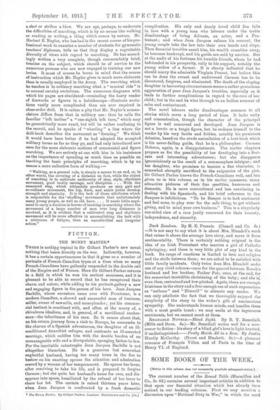FICTION.
THE MONEY MASTER,*
THERE is nothing topical in Sir Gilbert Parker's new novel, nothing that bears directly on the war. Indirectly, however, it has a certain opportuneness in that it gives us a number of portraits of French-Canadian types at a time when so many French-Canadians have gallantly responded to the double call of the Empire and of France. Here Sir Gilbert Parker returns to a field in which he won his earliest successes, and it is pleasant to be able to record that he has recaptured their charm and colour, while adding to• his portrait-gallery a now and engaging figure in the person of his hero. Jean Jacques Barbille, whose ancestors came over with Frontenao, is a modern Canadian, a shrewd and successful man of business, miller, owner of sawmills, and moneylender; yet his commer- cial instinct is combined with, and often at the mercy of, a chivalrous idealism, and, in general, of a meridional exuher- ance—the inheritance of his race. So it comes about that, on his return journey from a visit to Europe, he succumbs to the charms of a Spanish adventuress, the daughter of an ill- conditioned Anarchist refugee, and contracts an ill-assorted marriage, which saddles him with the double burden of an unmanageable wife and a disreputable, sponging father-in-law. For the inevitable catastrophe Jean Jacques Barbille is not altogether blameless. He is a generous but somewhat neglectful husband, having too many irons in the fire to bestow on his exacting spouse the attention and admiration craved by a woman of her temperament. He spares her lover, after resolving to take his life, and is prepared to forgive Carmen ; but she quits her husband's home for ever, and dis- appears into space, humiliated by the refusal of her lover to share her lot. The curtain is raised thirteen years later, when Jean Jacques is confronted by a fresh domestic • The Money Master. 13y Gilbert Parker. Loudon; Ilutchinson and Co. [Os.]
complication. His only and dearly loved child Zoe falls in love with a young man who labours under the treble disadvantage of being delicate, an actor, and a Pro- testant; and when Jean Jacques refuses his consent, the young couple take the law into their own hands and elope. Then financial troubles assail him, his wealth crumbles away, be becomes bankrupt, and his goods are sold by auction. But at the nadir of his fortunes his humble friends, whom he had befriended in his prosperity, rally to his support, notably the young widow of a farmer. It is clearly indicated that he should marry the admirable Virginia Poucet, but before this can be done the errant and undivorced Carmen has to be discovered, forgiven, and eliminated. The death of the eloping daughter in harrowing circumstances seems a rather gratuitous aggravation of poor Jean Jacques's troubles, especially as it leads to further complications in regard to the care of her child; but in the end he wins through to an Indian summer of calm and contentment.
The novel labours under disadvantages common to all Aeries which cover a long period of time. It lacks unity and concentration, though the character of the principal figure is well conceived and developed. Jean Jacques is not a heroic or a tragic figure, but he endears himself to the reader by his very faults and foibles, notably his persistent delusion, based on the crude assimilation of a text-book which is his never-failing guide, that he is a philosopher. Carmen Dolores, again, is a disappointment. The earlier chapters prepare us for the possibility of her developing into a first- rate and interesting adventuress ; but she disappears ignominiously as the result of a commonplace intrigue ; and her daughter, who promises to become a fine character, is somewhat abruptly sacrificed to the exigencies of the plot. Sir Gilbert Parker knows the French-Canadians well, and has given us in this volume, as in his earlier romances, many attractive pictures of their fine qualities, humorous and domestic. He is more conventional and less convincing in dealing with his Spaniards, and his brief reference to the Basques is infelicitous. " To be Basque is to lack sentiment and feel none, to play ever for the safe thing, to get without giving, and to mind your own business." This is a singularly one-sided view of a race justly renowned for their honesty, independence, and sincerity.


































 Previous page
Previous page